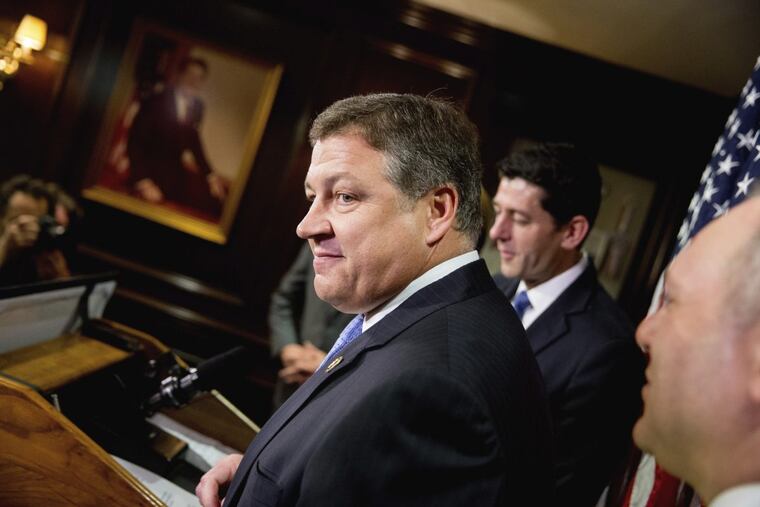With high-profile retirements, Pa. to lose experience, clout in Congress
Due to the retirements of four senior Republican members of the U.S. House, Pennsylvania is set to lose some of its juice in Washington. The latest was Rep. Bill Shuster, chairman of the powerful transportation committee, who announced Tuesday he would not seek reelection. He and his father have held the central Pennsylvania seat since 1973.

WASHINGTON — By the end of the year, Pennsylvania will have lost more than 50 years of experience in the U.S. House, along with the clout that kind of seniority brings.
Three Republican representatives from the state are not seeking reelection, and one veteran GOP House member resigned last fall amid a scandal. The power outage comes even before voters go to the polls in November, amid a political climate that could threaten even more incumbents in the Republican majority.
The latest decision landed Tuesday, when Rep. Bill Shuster, chairman of the powerful House Transportation and Infrastructure Committee, announced he would not seek a 10th term. He is the state's most senior Republican, and his exit will mark the end of a remarkable family run — Shuster and his father have held a central Pennsylvania House seat since 1973.
He joins Republican Reps. Charlie Dent, of Allentown, a moderate worn down by seven terms' worth of ideological battles; Tim Murphy, of Allegheny County, who retired under pressure in October amid revelations of an affair and abusive office behavior; and Lou Barletta, a Northeast Pennsylvanian who is running for the U.S. Senate.
"When you lose somebody of good seniority, you're losing an opportunity to have a good influence on the process," said Jim Gerlach, the former Republican congressman from Chester County.
The departures of Shuster and Dent in particular will cost Pennsylvania influence over major legislation worth billions of dollars to the state. Both men also had their hands on less formal levers of influence.
Dent heads the Tuesday Group, a coalition of center-right House Republicans, serving as a leading strategist for the bloc and making him a vocal figure in national debates.
As the heads of a major committee (in Shuster's case) and a key subcommittee (Dent), they also could set the agenda in their areas and shape major bills, deciding what would get added and what might be left aside.
Other lawmakers from Pennsylvania, from both parties, would turn to the high-ranking members when seeking something under their purview that might help their own districts, said George McElwee, Dent's former chief of staff.
"They kind of lean on each other in helping their own within the state," said McElwee, now a lobbyist whose clients include the state of Pennsylvania.
And those with seniority often use their expertise to guide the rest of the state's delegation on big decisions, said Alan Novak, a former GOP state chairman. "They deferred to the ranking member on various committees to get things done for Pennsylvania," Novak said.
Shuster, of Blair County, would have lost his transportation committee gavel even if he stayed in Congress, because of Republican rules imposing term limits on chairmen. But he also served on a caucus steering committee that decides who gets the best committee assignments, Gerlach said.
"Bill was our point person on the steering committee to work with leadership and the other steering committee members to help our [Pennsylvania] members get the assignments they wanted," Gerlach said.
Dent leads the House Appropriations subcommittee overseeing military construction and veterans' affairs, helping to steer tens of billions of dollars in spending.
Murphy had served nearly 15 years in Congress; Barletta will be in the House for eight by the time this term ends and he either moves to the Senate or leaves elected office. (He is seeking the nomination to challenge Democratic incumbent Sen. Bob Casey).
After Shuster and Dent, the most senior House Republican from Pennsylvania is Glenn Thompson, who took office in 2009. Four others have been in office since January 2011, including Barletta and Delaware County's Pat Meehan.
Democrats have had their own share of turnover among veteran lawmakers, with recent retirements of Montgomery County's Allyson Schwartz and the corruption conviction against Philadelphia's Chaka Fattah. But they still have senior lawmakers in Rep. Bob Brady, a Philadelphian in office since 1998, and Rep. Mike Doyle, a Pittsburgh-area lawmaker who has been in office since 1995.
Their experience helps, but it is the majority party that firmly controls legislation in the House.
Among the remaining Republicans, Thompson might be next in line to eventually lead a key panel. He is a senior member of the Agriculture Committee, which oversees a major Pennsylvania interest.
Meehan sits on the tax-writing Ways and Means Committee, and Rep. Ryan Costello, elected to succeed Gerlach in 2014, has a seat on the powerful Energy and Commerce Committee, although both men are relatively junior on those panels.